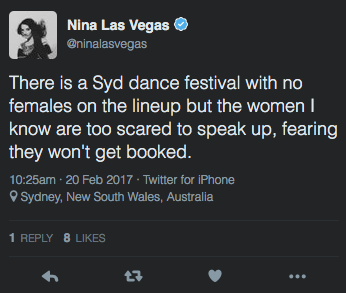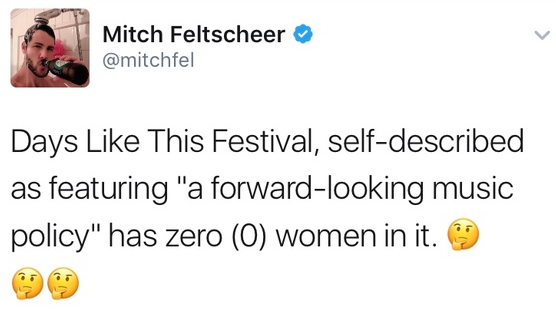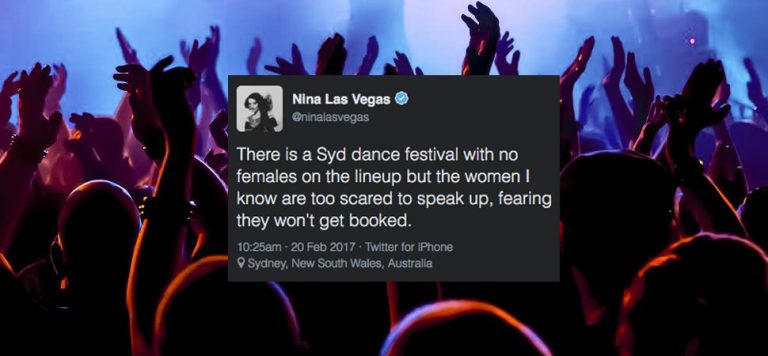We’ve spoken extensively about the need for music festivals to take a proactive stance when it comes to booking female acts on their lineups, but a storm is brewing surrounding the upcoming Sydney festival Days Like This, which is coming under fire for a complete lack of women on the bill.
Taking place next month, it brings together a host of local and international electronic talent and certainly boasts a great assortment of acts, but not one of the advertised thirty-plus names belongs to a female performer.
It’s a fact that hasn’t gone unnoticed, and respected female DJ and producer Nina Las Vegas appeared to take the first shots yesterday as she called out an as-yet-unnamed Sydney dance festival, with fellow high-profile female electronic act Alison Wonderland weighing in on the topic with anger.


The tweets have since been deleted, suggesting that even these two may have succumbed to some sort of pressure to remove them. We saw plenty of similar outcry each time this sort of booking shortfall occurred last year, but unfortunately we expect to be seeing plenty of “it’s 2017 smh” comments this year.
Adding fuel to the fire is that the festival – promoted by Division Agency, Paul Strange and Novel – describes itself as having a “forward-looking music policy” and a “fresh perspective”, which would seem to indicate that the future is, well, very male-dominated.
Music journo Mitch Feltscheer pointed out the obvious discrepancy on Twitter, drawing a pronounced eye-roll from triple j presenter Gen Fricker:


Situations like these aren’t exclusive to Australia, to be fair, with the massive Reading & Leeds festival in the UK revealing a similarly male-dominated lineup for this year, and receiving a similar reaction. Nina points out that it’s not her place to comment on the situation further, and that it’s the promoters who have to explain these mishaps.

We asked the festival organisers for their response, and they explain that female artists were originally planned to be on the lineup, shared with Days Like This by another electronic festival they’re promoting.
While it’s easy for people to argue that the organisers ultimately need to turn a profit and therefore simply book the most talented acts (or those with the biggest following) regardless of gender, that sort of argument undermines the importance of festival promoters actively seeking to provide a better gender balance on their lineups.
They have no commercial obligation to do so, but as a very visible part of the local music community, festivals surely have a responsibility to promote and involve itself in that community the best it can – and acknowledging female artists’ existence is a pretty small effort that needs to be made.
Some festivals are actively pushing female-centric lineups, but it really shouldn’t take anything so drastic to get even a couple of female artists onto a lineup, especially one with dozens of artists. The pool of genre-appropriate female acts that festivals can draw on isn’t as wide or as deep in many cases, but every effort should be made to consider all of the talent that is available – and try to book some women if you can manage it.
Our sister-publication The Brag published their own response to the issue, which you can watch below.


































